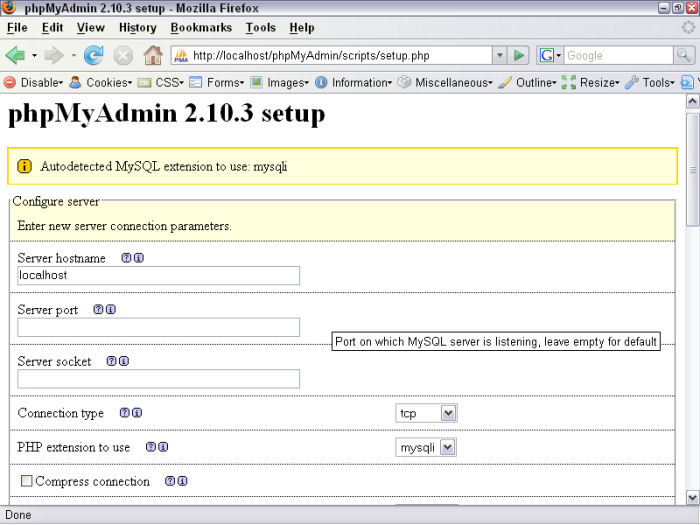

- PHPMYADMIN FOR PHP 7.1.3 HOW TO
- PHPMYADMIN FOR PHP 7.1.3 INSTALL
- PHPMYADMIN FOR PHP 7.1.3 VERIFICATION
- PHPMYADMIN FOR PHP 7.1.3 DOWNLOAD
Till step 3, it works fine, but when I use yum to install it, there I get an error. It is going good, but when I open my browser, it shows the mediawiki page with a warning that mediawiki 1.34 does not work with PHP version 5.4.16. I installed mediawiki using your following tutorial:
PHPMYADMIN FOR PHP 7.1.3 HOW TO
That’s all from this article, please do share your feedback and comments.Īlso Read: How to Install PHP 7.4 on CentOS 8 / RHEL 8 This confirms that you have successfully installed PHP 7.4 on your system. Open the web browser and type the ip of your server followed by info.php, Now create a info.php file under /var/www/html with following contents, ~]# cd html]# vi info.php I am assuming Apache web Server is installed on your system, start its service using below systemctl command ~]# systemctl start ~]#

PHPMYADMIN FOR PHP 7.1.3 VERIFICATION
Login to your RHEL 7 Server and run the beneath commands one after the another to enable EPEL repository, install remirepo and enable RHEL 7 Server optional repository ~]# rpm -Uvh ~]# wget ~]# rpm -Uvh remi-release-7.rpm ~]# subscription-manager repos -enable=rhel-7-server-optional-rpmsĢ) Configure PHP 7.x repo ~]# yum install ~]# yum-config-manager -enable remi-php74ģ) Install PHP 7.4 and its dependencies ~]# yum install php php-common php-opcache php-mcrypt php-cli php-gd php-curl php-mysql -yĤ) Verify PHP Version ~]# php -v PHP 7 Test Page Verification With Zend OPcache v7.4.4, Copyright (c), by Zend ~]# Installation Steps of PHP 7.x on RHEL 7 Serverġ) Enable EPEL, RHEL 7 Server Optional repository and Install remirepo rpm Zend Engine v3.4.0, Copyright (c) Zend Technologies Once PHP and its dependencies are installed in step4), use below command to verify the installed PHP version, ~]# php -v Note: To search all PHP modules use below command: ~]# yum search php | more In this tutorial, I will install latest version of PHP 7.4 along with its modules, Run beneath yum command ~]# yum install php php-common php-opcache php-mcrypt php-cli php-gd php-curl php-mysql -y

To configure PHP 7.4 repository, use below command ~]# yum-config-manager -enable remi-php74Ĥ) Install PHP 7.4 along with dependencies. To configure PHP 7.3 repository, use below command ~]# yum-config-manager -enable remi-php73 To configure PHP 7.2 repository, use below command, ~]# yum-config-manager -enable remi-php72 To configure PHP 7.1 repository, use below command, ~]# yum-config-manager -enable remi-php71
PHPMYADMIN FOR PHP 7.1.3 DOWNLOAD
Login to your server and use the below yum command to install yum-utils & enable epel repository ~]# yum install epel-release yum-utils -yĢ) Download and Install remirepo using yum command ~]# yum install ģ) Based on your requirement, configure the PHP 7.x repository You can install any version of PHP such as 7.2, 7.3 or 7.4 on Ubuntu or Debian using the same installation steps.Installation Steps of PHP 7.1, 7.2, 7.3 and 7.4 on CentOS 7 Serverġ) Install yum-utils and enable EPEL repository Loaded Configuration File: /etc/php/7.1/cli/php.iniĮdit the file using your preferred text editor: You will see the output similar to the following: Once the installation is completed you need to edit the php.ini file:įind the php.ini configuration file like below: Sudo apt-get install php7.1 php7.1-cli php7.1-common php7.1-json php7.1-opcache php7.1-mysql php7.1-mbstring php7.1-mcrypt php7.1-zip php7.1-fpm To install PHP7.1 including some of the most commonly used modules you can use the following command: Once you enabled the ondrej/php PPA, you can install PHP 7.1 using the below command: If you are on Ubuntu 16, the only version of PHP available in its default repository is 7.0 and therefor you need to add Ondrej’s PPA to get the PHP version of your choice: sudo apt-get install software-properties-common


 0 kommentar(er)
0 kommentar(er)
